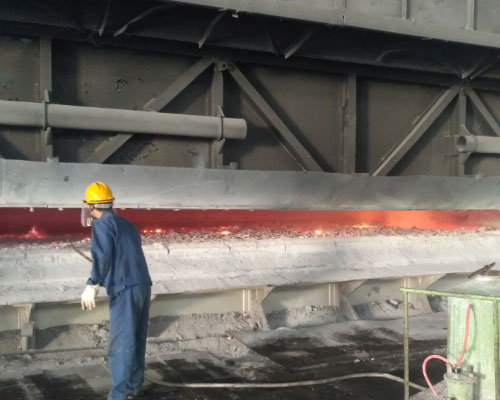Furnace refining refers to the refining process. The pretreatment of the aluminum liquid includes furnace refining and online purification. The results show that the temperature of molten aluminum is high and the number of nucleation of new phase in unit time and unit volume is low. The temperature of electrolytic aluminum liquid can reach above 930 ℃. Its composition is also very complex, containing many metal impurities such as Fe, Si, Cu, Mg, and non-metallic impurities such as fluorides and carbon slag, and the gas impurities are mainly hydrogen. However, these characteristics of electrolytic aluminum liquid can not meet the requirements in the production of aluminum alloy flat ingots. In order to solve this problem, it is necessary to pretreat the electrolytic aluminum liquid before casting.
Furnace Refining
Furnace refining refers to the refining process in which the gas is used to spray powder in the static furnace. The refining agent with the main components of CCl4 and C2Cl6 is put into the gas dusting tank according to the dosage of 1.0kg/t. When the refining agent turns into bubble, it can enter the electrolytic aluminum liquid. The detailed process is as follows: the state of refining agent after preheating changes from solid state to liquid state, which is surrounded by bubble surface of gas powder spraying tank in the form of liquid flux film. The melting furnace and the powder spraying tank are firmly connected, and then the nozzle of the powder spraying tank is inserted into the electrolytic aluminum liquid, and the valves of the powder spraying tank are opened at the same time, and the pressure and flow rate are well controlled, and the powder spraying tank is operated to move back and forth in the furnace, so as to carry out uniform powder spraying refining. The refining time is generally controlled between 30 min and 40 min, and the refining temperature is controlled between 730 ℃ and 750 ℃. In this way, the bubble speed of molten aluminum wrapped by flux film is accelerated, and the occurrence of direct contact with external water is prevented. Another function of flux membrane is to improve the surface activity of bubbles, thus enhancing the effect of adsorption and slag removal.

The on-line impurity removal mainly includes two parts:
(1) Online alpur hydrogen removal: when online alpur method is adopted, the online degassing unit is baked with natural gas before use, so that the lining temperature is not lower than 700 ℃. High purity nitrogen is used in the traditional method. However, due to a certain amount of Mg in the aluminum alloy, during the melt treatment, the Mg and nitrogen in the aluminum alloy are subjected to high temperature, and chemical reaction occurs to generate magnesium nitride, which produces impurities and affects the quality of the finished product. Therefore, the online alpur method is used to remove hydrogen and argon is used to replace nitrogen. In this process, the pressure of argon is required to be 550 kPa ~ 760 kPa, and the purity should be above 99.99%. Due to the strong stirring effect of the rotating nozzle, the contact area between argon and electrolytic aluminum liquid is effectively increased, and the kinetic conditions of floating purification process are improved. At the same time, due to the slow rising speed of the tiny bubbles in the molten aluminum melt, the bubbles in the molten pool spiral up under the combined force of centrifugal force and buoyancy force, thus prolonging the gas-liquid contact time and achieving the purpose of removing hydrogen from the melt.

(2) Online impurity removal: the CFF box can filter out the impurity in the aluminum liquid. CFF box is used for the filtering and purifying of the molten aluminum, matching with the ceramic foam filter. It can filter the inclusions and tiny particles in the molten aluminum. Especially suit for the casting high purity aluminum and high precision aluminum alloy. It has the advantages with thermal resistance, anti-oxidation, corrosion resistance, warming up quickly, long lifetime and acid resistance.

